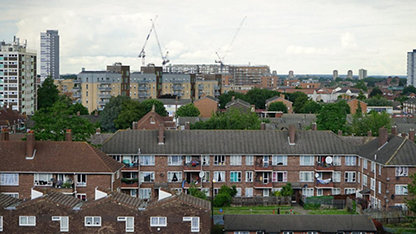On 12 April 2025, 08:00 BST, we will be disabling logins for specific member-facing platforms to improve internal processes. We expect this to finish 12 April 2025 at 17:00 BST.
The built environment looks set to have a challenging 2023, with inflation, material supply and labour pressures continuing to impact the sector. On top of this, there is the essential need to keep focused on addressing the causes of climate change, including decarbonisation and energy efficiency.
Housing supply
One of the fundamental challenges in the housing sector is the continuing lack of high-quality, affordable homes. This inadequate supply of housing has a direct correlation on property prices, rent and quality – which brings with it wider economic and social challenges.
At the end of 2022, the UK Government abandoned its 300,000 annual target for new homes, having never met the long-held ambition.
Developers have told RICS of consistent challenges in recent years, with Brexit, then the Coronavirus pandemic and now the cost-of-living crisis and ongoing conflict in Ukraine. BCIS data recorded a 22.3% rise in construction materials between 2021 and 2022, significantly hindering project costs and forcing developments to downsize. Add to this a major labour shortage. Then there is the planning system – which is already under significant resource pressures and now nutrient neutrality guidance is having a significant effect on developments.
The Levelling Up & Regeneration Bill offers several reforms to planning, with a greater emphasis on community-level schemes. RICS have been engaging through the progression of the Bill and recently published our 10-point Levelling Up and Sustainable Placemaking Report. This year, RICS is calling on the government to:
- Reinstate the housebuilding target, which has direct links with the need for planning authorities to maintain a five-year land supply. This will demonstrate ambition and confidence in the sector.
- Ensuring sustainable placemaking remains at the heart of the Levelling Up agenda, including data modelling to plan local and regional needs.
- Review the Shortage Occupation List for immigration purposes to expand those working within construction, helping to facilitate labour shortages and cutting red tape in recruitment.
- Use the nutrient Strategic Mitigation Scheme introduction to work with the water industry and developers to improve treatment works and solutions to minimise pollution impacts within catchment areas.
- Work with developers to review the impact inflation and labour shortages is having on current and planned projects. This includes using services such as DRS to minimise risk of disputes due to project delays or down-scaling.
- Explore opportunities through stamp duty, council tax and other means to incentivise downsizing.
- Continue to work with RICS and industry to address the challenges of building safety. This includes the ongoing expansion and role out of PAS 9980 and the recent updated valuation guidance from RICS to support the buying and selling process.
Energy efficiency and decarbonisation
Climate change and sustainability are embedded into all our work at RICS, and even more so given the ongoing cost-of-living and energy crisis that has impacted all parts of the UK.
90% of new-build homes currently achieve EPC A or B, yet around 60% of existing owner-occupier homes fail to meet even EPC C. Failure to decarbonise and create energy efficient homes in the UK has significant environmental, economic, social and security risks. RICS is calling on the government to:
8. Action the recommendations from the recent RICS Decarbonising UK Real Estate that call for reform to how energy measurement and EPCs are presented, including the introduction of four new metrics:
- fabric energy efficiency (the capacity of the building fabric to retain heat, in kWh/m2/y)
- space heating demand (the share of energy required only for heating. in kWh/ m2/y)
- peak energy load (the maximum energy demand at one point in time, in kW)
- on-site renewable generation capacity (in kWh/y)
- Develop a framework for encouraging and requiring retrofitting, including responding to the ‘Mission Zero: Independent Review of Net Zero’ recommendations on introducing minimum energy standards for house sales (where applicable) and greater upfront information for renters on estimated energy bills.
- Clarify proposals on the requirement for mortgage lenders to achieve EPC C averages across their portfolio by 2030.
- Legislate the Carbon Emissions (Buildings) Bill going through Parliament which will measure, track and encourage the decarbonisation of real estate.
- Ensure the Eco Plus scheme and future energy and decarbonisation improvement funds embed the requirement for retrofit assessments, undertaken by competency-based professionals, to be part of the process – helping to support consumers with understanding the most effective measures to invest in, and install.
- Encourage and expand the use of Building Passports, especially in multi-block tenures, to facilitate retrofitting of hard-to-treat properties.
Private rental sector
Recent years have seen extreme pressures in the private rental sector (PRS), with declining housing stock seeing increasing competition among perspective tenants and increasing rents.
Significant changes in the sector are seeing an increasing number of landlords either sell properties or leave the market altogether, and while some will be purchased by new homeowners or landlords, demand for private rent remains high.
Changes in the tax system across the UK, new quality and energy standards, as well as rent controls in Scotland and reforms in Wales have all added pressures on landlord. With recent record rises in house prices, many landlords have taken this opportunity to sell up – further adding to the limited support of PRS homes. To support the sector and help those looking to rent, RICS is calling for the government to:
- Provide certainty, at the earliest possible time, on new regulations for landlords to adhere to, including the Decent Homes Standard and Minimum Energy Efficiency Standards – which at present will mean all new PRS lets from 2025 must meet EPC C.
- Ensure announcement on new regulation dates must be backed by fiscal and advice support for landlords – many of whom may be asset rich, but cash poor, limiting their ability to invest in the work.
- Support owners and tenants by adopting the upcoming ‘RICS Service charge residential management Code’ which will give greater protection for those in leasehold and commonhold properties.
- Revaluate current regulations and standards in the PRS to create a system that protects tenants' rights, and supports landlords.














